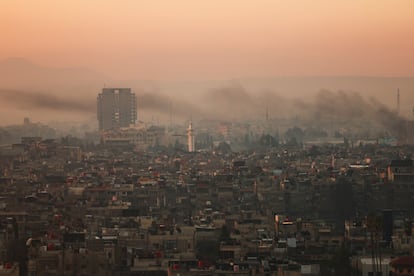A future for Syria
One month after the fall of Assad, pressure must be placed on the new authorities to prevent them from drifting towards Islamism

Syria is breathing something resembling freedom barely a month after the fall of Bashar al-Assad. Statues and symbols of the deposed regime have been torn down, prison doors have been opened, and images have emerged depicting the horror of torture, executions and mass graves. It is a new beginning for the martyred country after a 13-year war and a cruel family dictatorship lasting half a century. However, there is a very uncertain political horizon ahead for a country in the middle of an unstable region torn apart by war.
As the new unofficial head of state, Ahmed al-Shara — known as Abu Mohammed al-Julani during the war — the head of the jihadist group Hayat Tahrir al-Sham (HTS), has taken up residence in the palaces where the dictator once lived, but he neither controls the territory nor technically governs the state. Thanks to the moderation shown in his aims and gestures, the U.S. has withdrawn the $10 million bounty on his head to eliminate this former jihadist. Diplomats from around the world are returning to Damascus, notably those from the European Union, to outline the conditions for the financial and diplomatic aid that must follow political normalization.
The immediate objective of the new government is to get international sanctions lifted and HTS, the currently ruling party, off the list of terrorist organizations. Its track record is not the best for such steps to take place without prior guarantees, especially if there is no tangible progress in social and political life. It is essential that the new authority guarantee respect for all citizens, regardless of their sex, religion or ethnicity, including the Alawite ethnicity, to which the Assads belong. The EU must not accept a regime that discriminates against women, nor a justice system guided by Sharia law in the style of the Afghan Taliban or Arab Wahhabism.
Peace is also essential. The war is not over yet: clashes between Kurdish and Turkish forces are recurring, the Islamic State is present in the territory, there are skirmishes with remnants of the Assad army on the border with Lebanon, and Israel persists in its bombings. Turkey and Israel have the power to facilitate Damascus’ control of the territory, although it is to be feared that the priority of both countries, like that of Saudi Arabia, is not Syria’s stability but their own influence. A definitive exit by Russia and the disappearance of any support for Iran would be in everyone’s interest. In this whole scenario, the actor with the most influence on the new Syrian authority is Turkey, the main supporter of the rebels. Ankara is emerging as a privileged interlocutor to influence what happens from now on in Damascus, and it is to be expected that it will use this diplomatic trump card in its dealings with Europe and the U.S.
The tasks facing the Syrians are immense. They must build a new army after the dissolution of the guerrillas, control the territory and borders, find and judge those responsible for the atrocities of the dictatorship, restore normality and economic life, and begin a constituent process. At the moment, the timetable suggested by Al Shara, which has announced a margin of two or three years for a new Constitution and four for the first elections, does not seem to be the best. It is advisable for the recently won fragile freedom to be consolidated and to acquire constitutional status as soon as possible, duly endorsed by free and plural elections, before the jihadist group that has taken power settles into a new Islamist dictatorship.
Sign up for our weekly newsletter to get more English-language news coverage from EL PAÍS USA Edition
Tu suscripción se está usando en otro dispositivo
¿Quieres añadir otro usuario a tu suscripción?
Si continúas leyendo en este dispositivo, no se podrá leer en el otro.
FlechaTu suscripción se está usando en otro dispositivo y solo puedes acceder a EL PAÍS desde un dispositivo a la vez.
Si quieres compartir tu cuenta, cambia tu suscripción a la modalidad Premium, así podrás añadir otro usuario. Cada uno accederá con su propia cuenta de email, lo que os permitirá personalizar vuestra experiencia en EL PAÍS.
¿Tienes una suscripción de empresa? Accede aquí para contratar más cuentas.
En el caso de no saber quién está usando tu cuenta, te recomendamos cambiar tu contraseña aquí.
Si decides continuar compartiendo tu cuenta, este mensaje se mostrará en tu dispositivo y en el de la otra persona que está usando tu cuenta de forma indefinida, afectando a tu experiencia de lectura. Puedes consultar aquí los términos y condiciones de la suscripción digital.









































